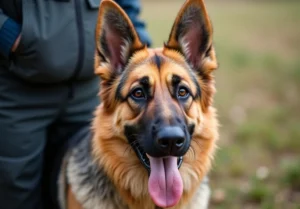Every dog goes through distinct life stages, and each one requires tailored socialization to help them thrive. The key to a well-adjusted dog is understanding their social needs at every phase of life.
Socialization for dogs is critical at various life stages, influencing their behavior, adaptability, and overall well-being. Proper socialization allows dogs to interact positively with their environment, which in turn fosters confidence and reduces anxiety. There’s a wealth of insightful details that can make this journey smoother for both dogs and their owners, so keep reading to uncover expert tips and tricks that will change the way you view your dog’s growth.

What Are the Key Life Stages for Dogs?
Understanding the key life stages of dogs is essential for tailoring their care and socialization needs. These stages are crucial in shaping their behavior, temperament, and overall well-being. Here’s a breakdown:
Puppyhood (0-6 months) : This is a critical period for development. Puppies are highly impressionable and learn about their environment through experiences. Early socialization should focus on introducing them to various sights, sounds, people, and other animals.
Adolescence (6 months-2 years) : During this stage, dogs often test boundaries and may exhibit some challenging behaviors as they reach maturity. Continued socialization is important to help them become well-adjusted adults.
Adulthood (2-7 years) : Most dogs settle into their temperament during this phase. Maintaining socialization with new experiences and interactions helps keep their behavior balanced.
Senior Years (7+ years) : Dogs may slow down physically and become less tolerant of unexpected changes. Socialization should be gentle, ensuring they stay engaged without overwhelming them.
Each life stage is unique, with specific socialization needs that evolve as dogs grow. Tailoring socialization efforts to these phases supports emotional health and positive interactions throughout a dog’s life.
Why Is Early Socialization Important?
The importance of early socialization can’t be overstated. Puppies are like sponges, soaking up everything around them in their first few months. This period is the perfect opportunity to shape their future behavior.
A well-socialized puppy is more likely to be calm and confident in various situations. They learn how to interact with other dogs and humans, which is critical for their development. This ensures they’re less likely to develop fear-based behaviors or aggressive tendencies later on.
Socialization also helps with fundamental training. A puppy that’s accustomed to different people, sounds, and environments is more likely to respond positively to commands and be adaptable in new settings. Here are some specific benefits of early socialization:
Improved confidence : Puppies who experience diverse stimuli gain confidence, reducing anxiety in new situations.
Better interactions : Socialized dogs learn to play nicely and communicate effectively with others, avoiding misunderstandings.
Reduced fear : Early exposure to various environments and experiences lowers the likelihood of fear-based reactions and phobias as they grow.
Aim for a range of experiences, from meeting different types of people and pets to visiting new places. Puppy classes can also be an excellent resource, providing structured settings for safe interactions. For more detailed guidance on effective puppy socialization, check out this resource from the Association of Professional Dog Trainers.
By focusing on these early experiences, you’re setting your dog up for a lifetime of positive interactions and good behavior.
How Should Puppies Be Socialized?
Socializing puppies isn’t just about getting them used to the world; it’s about building confidence and ensuring they’re well-adjusted companions. Jumping into varied environments is key—think parks, busy streets, or pet-friendly stores. Each new experience teaches your puppy that the world is a place full of fun and positivity.
Start introducing your puppy to people in different settings. The more faces they meet—from infants to adults wearing hats—the better. Just as important is the presence of other animals. Let them play with dogs of all sizes and temperaments but always supervise their interactions to ensure everyone’s safe.
Here’s a concise list of effective socialization strategies for your puppy:
- Expose to Different Environments: Take short trips to new places, like busy streets, quiet parks, or even coffee shops.
- Introduce Various Sounds: Play recordings of typical household noises—vacuum cleaners, thunder, or doorbells—to get them used to everyday sounds.
- Meet Different People: Invite friends and family over to introduce your puppy to new faces. Consider visiting places with diverse crowds.
- Arranged Playdates: Schedule regular meetups with other vaccinated puppies or gentle adult dogs.
- Positive Reinforcement: Use treats and praise to encourage your puppy to engage with new situations, ensuring they feel safe and positive.
Taking the time to socialize your puppy properly is a crucial step in developing a well-rounded dog that can thrive in various social settings.
What Socialization Needs Do Adult Dogs Have?
Adult dogs also require ongoing socialization to ensure they remain comfortable in different situations. Just because they’re out of the puppy phase doesn’t mean their experiences should stop. Regular interactions with humans and other animals help reinforce their training and maintain their adaptability.
Create opportunities for your adult dog to encounter new experiences regularly. This can involve simple activities—like taking different routes on daily walks or introducing them to new parks. Interacting with other dogs remains important, too, especially in settings where they can observe and engage with varied behavior.
Here’s a quick list of socialization tips for adult dogs:
- Attend Dog Classes: Ongoing training classes are great for socialization. They provide structured environments where dogs can learn while meeting new companions.
- Explore New Places: Regularly change your walking routes or visit dog-friendly events to keep things fresh for your dog.
- Join Community Activities: Participate in dog meet-ups or local events. Networking with other dog owners can enrich both your experience and your dog’s.
- Practice Exposure to Different Stimuli: Whether it’s fireworks, large crowds, or children playing, safely exposing your dog to various stimuli helps them stay grounded and confident.
- Volunteer at Animal Shelters: This not only helps socialize your dog but also benefits dogs in need of extra love and attention.
By incorporating these efforts into your routine, you not only keep your adult dog happy and well-adjusted but also strengthen your bond through your shared experiences.
For further insights, check out resources from the ASPCA that detail socialization practices throughout a dog’s life: ASPCA Socialization.
How Can Seniors Benefit From Socialization?
Senior dogs have unique social needs that can greatly improve their quality of life. As they age, maintaining their emotional and mental well-being becomes increasingly important. Engaging with other dogs and people can help combat feelings of loneliness and isolation, which many older dogs experience.
Regular social interactions can stimulate their minds, keeping cognitive decline at bay. Simply being around other pets and new environments fosters curiosity and encourages physical activity, essential for maintaining a healthy weight and joint mobility.
Additionally, familiarizing seniors with different environments and situations can reduce anxiety that comes with aging. For instance, a calm visit to a dog park or a stroll through a busy neighborhood can help them feel more comfortable in various settings, lessening the fear that often accompanies sensory overload in later life.
Here are some practical ways to promote socialization in senior dogs:
- Join a dog-friendly class: Many places offer training classes specifically for older dogs.
- Set up playdates: Connecting with other dog owners can provide safe and enjoyable interactions.
- Visit pet-friendly stores: Trips to pet shops or cafes can expose them to new scents and sounds.
Keep in mind that the goal is not just about interaction; it’s about quality experiences that bring joy and comfort to their senior years.
What Are the Risks of Poor Socialization?
Neglecting proper socialization, especially during critical early stages, can pave the way for serious behavioral problems later on. Puppies without adequate interaction may grow up to exhibit fear-based behaviors, such as excessive barking, growling, or hiding when faced with new people or environments. This can lead to a vicious cycle where the dog becomes increasingly withdrawn and anxious.
Additionally, untrained or unsocialized dogs can struggle with basic commands and interactions. For example, without proper exposure to various experiences, a dog may become overly aggressive toward strangers or other animals, leading to both safety issues and distress for their owners.
Here are key risks related to poor socialization:
- Anxiety: Unsocialized dogs often exhibit separation anxiety or fear-based aggression.
- Aggression: Lack of exposure can lead to unpredictable or aggressive behavior.
- Stubbornness: Dogs may resist training and common commands without early positive experiences.
To counteract these risks, early and ongoing socialization is essential. Seeking help from a professional trainer can make a huge difference, especially in overcoming existing issues and building a more relaxed demeanor.
For a deeper understanding of canine anxiety and effective socialization strategies, check out PetMD’s guide on managing anxiety in dogs.
How Can Owners Facilitate Positive Interactions?
Creating positive social experiences for your dog is all about setting the stage for healthy interactions. From puppyhood to adulthood, the types of interactions your dog has can shape their behavior and sociability. Here are a few practical tips to foster those positive moments:
Early Exposure: Start socializing during puppyhood. Introduce your puppy to various environments, people, and other pets. Just make sure these experiences are positive and not overwhelming.
Playdates: Arrange regular playdates with dogs of similar temperament. Monitor the interactions to ensure they’re healthy and play remains balanced.
Group Classes: Enroll in obedience or agility classes. Not only do dogs learn commands, but they also get the chance to meet other dogs and people in a structured setting.
Daily Outings: Take walks in busy areas, visit dog parks, or attend local dog-friendly events. These experiences provide social opportunities and help your dog acclimate to new surroundings.
Positive Reinforcement: Reward your dog for calm behavior during social interactions. Use treats or praise to encourage friendly behavior towards others.
Handle Uncomfortable Situations: If your dog reacts negatively during social interactions, don’t punish them. Instead, remove them from the situation or provide calming strategies like taking a step back or using a favorite toy.
Consistency is key. Encourage these positive experiences throughout your dog’s life, adjusting the intensity and nature of activities as they mature. By understanding their developmental stage, you can cater to their needs effectively.
What Role Does Training Play in Socialization?
Training isn’t just about learning commands; it’s a pivotal aspect of socialization. Well-trained dogs tend to be more confident, making them more at ease in various social situations. Here’s how training interlinks with socialization:
Effective training helps establish boundaries and expectations. If a dog knows commands like “sit” or “leave it,” they can better control their impulses when faced with distractions, whether it’s a squirrel or another dog. This control can lead to calmer interactions.
Moreover, training sessions themselves can be social gatherings. You’re not just teaching your dog; you’re also providing them opportunities to interact with other dogs and people. This dual benefit makes each class a worthwhile investment.
Consider adding real-world settings to training. Practicing commands in parks or cafes exposes your dog to various stimuli while reinforcing their learning in different environments. The combination of structured training and social exposure can significantly enhance your dog’s adaptability.
Tips for Effective Training & Socialization:
Start Early: Focus on basic commands and exposure to new environments during early development.
Use Positive Reinforcement: Reward desirable behavior consistently, making it clear what you expect.
Stay Calm: Dogs can pick up on their owner’s stress. Keep training sessions positive and enjoyable.
Make It Fun: Incorporate games that enhance social skills, helping your dog learn while playing.
For a deeper insight into how training can elevate your dog’s social skills, check out the resources provided by the Association of Professional Dog Trainers.
By intertwining training with socialization, you’ll likely find your dog becomes a well-rounded companion, eager to engage with the world around them.
Are There Unique Socialization Challenges for Rescue Dogs?
Rescue dogs often come with a unique set of socialization needs due to their varied backgrounds. Unlike dogs raised in stable environments, they might have experienced trauma, neglect, or simply a lack of exposure to different environments, people, and other animals. This can lead to behaviors like fearfulness, anxiety, or even aggression in unfamiliar situations.
Many rescue dogs haven’t had the chance to interact with people or other dogs in a safe way, which makes positive experiences essential for building their confidence. They may react differently to new stimuli, like loud noises or sudden movements, and this unpredictability can be challenging. Training needs to be consistent, gentle, and tailored to their individual pace.
It’s important to focus on building a trust-based bond. This can be achieved through patience, positive reinforcement, and gradual exposure to new experiences. For instance, a rescue dog might need time to acclimate to meeting new people, so guiding them through structured introductions can be effective. Connecting with a support group or a local rescue organization can also provide valuable resources and socialization experiences for both the dog and the owner.
What Are Fun Activities to Promote Socialization?
Engaging your dog in playful and social activities is a great way to help them flourish. Here’s a list of enjoyable exercises that can really boost your dog’s socialization skills:
Group Training Classes : Join a local class to teach new skills while interacting with other dogs and people. It’s not just about obedience; it’s about building confidence.
Dog Parks : A visit to a dog park gives your pup the chance to interact freely with peers. Just be sure to assess your dog’s comfort level and pick less crowded times if needed.
Pet-Friendly Events : Participate in community events where dogs are welcome, like fairs or markets. These environments offer varied stimuli, helping your dog learn to stay calm amid excitement.
Playdates with Friends’ Dogs : Arranging playdates is a great way for your dog to meet others one-on-one in a controlled setting. This helps reduce anxiety.
Exploring New Environments : Take your dog for a walk in different neighborhoods or nature trails. New sights and smells are great for stimulating their senses.
Interactive Toys or Puzzle Games : Engage your dog’s mind with toys that require problem-solving. This keeps them busy and helps reduce anxiety during down time.
Remember, always observe your dog’s reactions and adjust activities accordingly to ensure positive experiences. One additional tip: celebrate small wins during socialization sessions. Each step forward builds their confidence!
Alex, a passionate animal lover, has experience in training and understanding animal behavior. As a proud pet parent to two dogs and three cats, he founded AnimalReport.net to share insights from animal experts and expand his knowledge of the animal kingdom.




